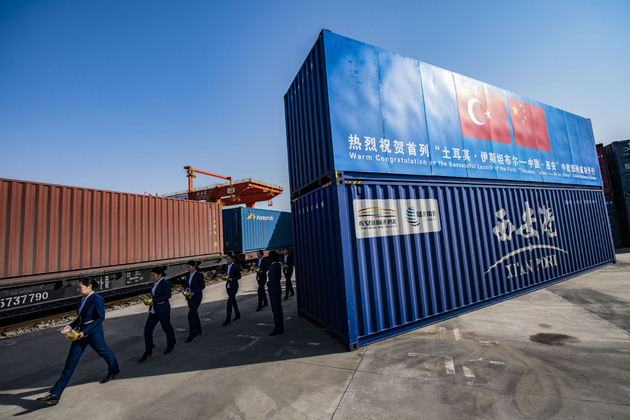The China-Europe Railway Express, which runs across the Eurasian continent, has experienced considerable progress during the past 10 years, and will continue to see strong momentum in the future, said a Turkish official. Turkey's ambassador to China, Abdulkadir Emin Onen, said the China-Europe Railway Express marks a significant phase in Eurasian rail transport development. "The railway connection between the two continents became even more vital in the pandemic era when the freight trains played a crucial role in stabilizing the international logistics supply chain, due to limited air and maritime transport options," Onen said, China Daily reports.
"As part of the Belt and Road Initiative, which Turkey has supported from the beginning, this route has experienced remarkable progress over the past 10 years and will continue to develop."
Data from China State Railway Group Co Ltd showed about 7,377 freight trains of the China-Europe Railway Express operated in the first half, up 43 percent year-on-year.
In the January-June period, about 707,000 twenty-foot equivalent units of containers were delivered, up 52 percent on a yearly basis.
Since the first China-Europe freight train departed from Chongqing in March 2011, the China-Europe freight train service has recorded more than 40,000 trips, reaching more than 160 cities in 22 European countries. And transported goods were valued at over $200 billion, said the group.
According to Onen, the China-Europe Railway Express has also benefited from Turkey's ongoing construction and improvement of railways, facilities and services.
The initiation of direct freight train services between Turkey and China in December 2020 is the most recent and substantial example of such development. The train follows the Trans-Caspian East-West-Middle Corridor via the Baku-Tbilisi-Kars railway. Its route covers almost 8,700 kilometers, passing through two continents, two seas, five countries and forwarding its freight from Istanbul to Xi'an in less than two weeks.
More trains followed the first one in recent months and there are plans to make a regular and more frequent schedule of freight trains between Turkey and China, he said.
"The shift of economic gravity toward the East generates a continuous growth in the transport of goods between Asia and Europe. The pandemic did not alter this trend; it has even strengthened it," Onen said.
Official data showed bilateral trade between Turkey and China reached $26 billion in 2020 despite the coronavirus impact, marking one of the highest figures for any bilateral commerce between European and Asian countries.
Moreover, Onen said ongoing commercial, financial and investment contacts between Turkey and China suggest that it is very possible to surpass $50 billion in the coming years.
He said further use of the railway connection between Turkey and China will accelerate economic activities across Eurasia and this in turn will be beneficial for the two sides' bilateral economic relations.
"Turkish and Chinese products will be more easily delivered via the freight trains," Onen said. "Highly qualified Turkish brands and products, which are well sought-after in many parts of the world, will become more available in the vast Chinese market. Particularly, they will be integrated into e-commerce platforms in China. We therefore encourage Turkish and Chinese businesspeople to make better use of Turkey-China freight trains, which opened up as a new commercial gateway between the two countries."
Turkey, thanks to its unique geographical location, historically played a significant role in connecting Europe and Asia. This is manifested by the well-known Silk Road, and other cross-regional trade routes such as the Spice Road. Turkey's strategic position at the intersection of Europe, Asia and the Middle East still paves the way for its role as the regional transportation hub, which has gained noticeable momentum in recent years.
Onen said massive infrastructure projects in Turkey, including high-speed railways, have greatly contributed to achieving Eurasian connectivity.
For instance, Turkey is constructing the Edirne-Kars High Speed Network, which will enable faster and cheaper transport between China, and Central Asia and Europe.
"There is now a special focus on transforming high-speed railways in the country, with the goal of constructing an additional 5,500 km of high-speed railway and rapid lines by 2023. With the aim of taking advantage of the railways in carrying goods and products as well, various logistics centers are being constructed across the country," Onen said.
Turkey has been one of the earliest supporters of the BRI. In 2015, Turkey and China signed a memorandum of understanding on aligning the Belt and Road Initiative and the Middle Corridor Initiative.
According to Onen, the two nations have similar outlooks for deepening regional economic cooperation on the vast Eurasian landmass via transport corridors, and relevant Turkish and Chinese authorities are planning a high-level meeting soon on this topic.
"The rapid global transformation is marked by the rise of the Asian continent and the connectivity projects. The deepening Turkish-Chinese cooperation in transportation and logistics sectors will surely result in more prosperity and stability across Eurasia," he added. "The recent initiation of direct freight trains between Turkey and China was one of the most successful examples of this cooperation. Broader opportunities of collaboration lie in front of us as long as we continue to galvanize our joint efforts," he added.






